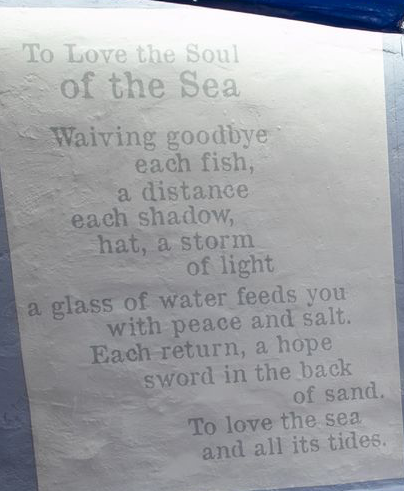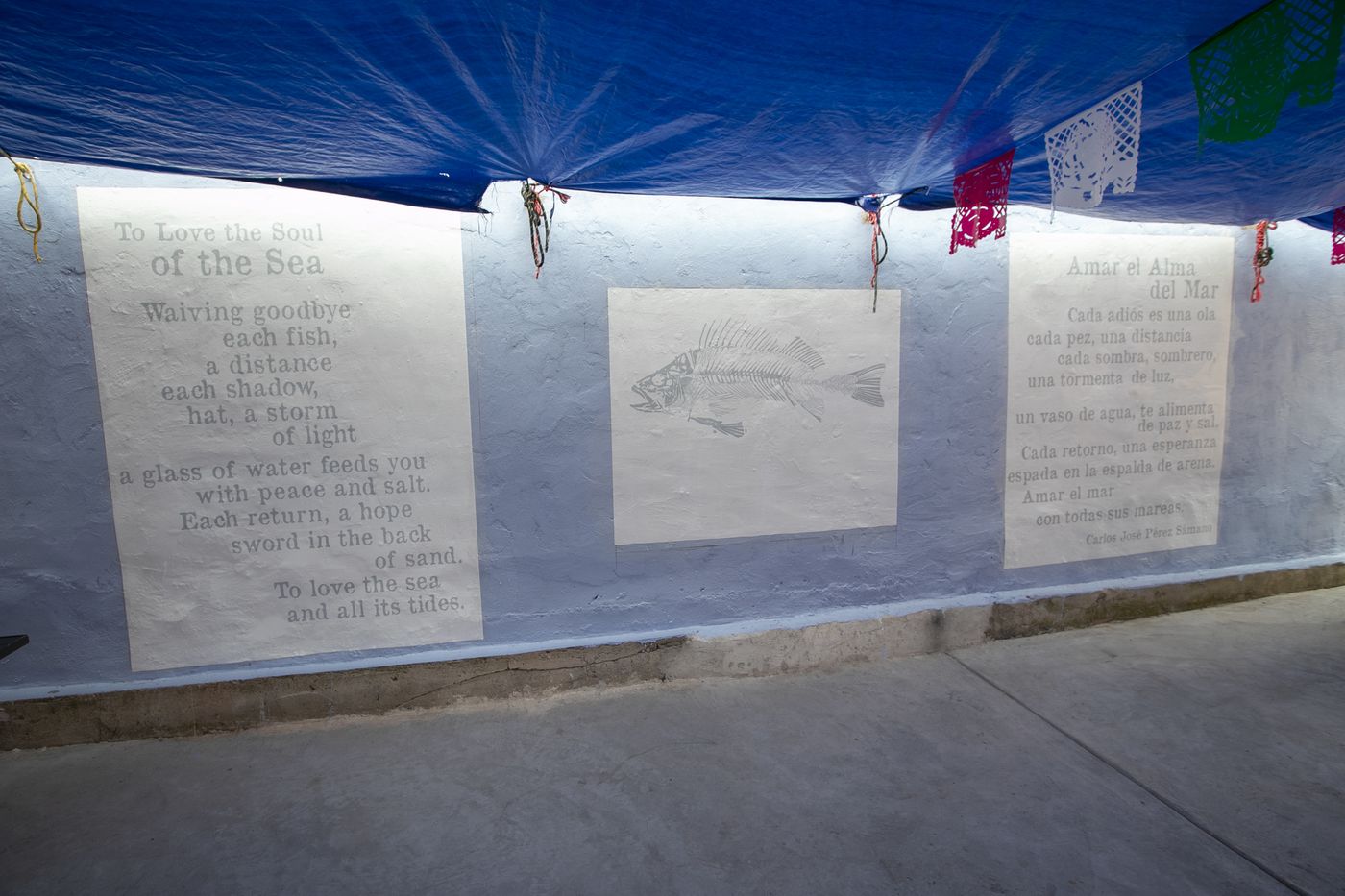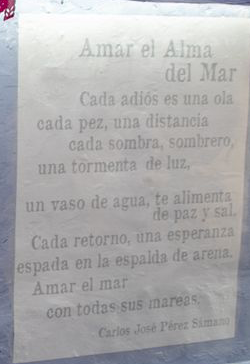"Waiving goodbye"
« previous post | next post »
Yesterday morning, two friends and I ate at Alma del Mar, a new Philadelphia restaurant, on an outdoor terrace featuring a mural unveiled just a few days ago.
There are three panels: on the right is a poem in Spanish by Carlos José Pérez Sámano; there's a fish skeleton in the middle; and on the left, an English version.
Although I claim the title of the world's worst proofreader, I did notice an odd spelling in the first word of the English version:

Waiving goodbye
each fish,
a distance
each shadow,
hat, a storm
of light
a glass of water feeds you
with peace and salt.
Each return, a hope
sword in the back
of sand.
To love the sea
and all its tides.
Cada adiós es una ola
cada pez una distancia
cada sombra, sombrero,
una tormenta de luz.
un vaso de agua, te alimenta,
de paz y sal.
Cada retorno, una esperanza
espada en la espalda de arena.
Amar el mar
con todas sus mareas.
At first I thought waiving goodbye was a mistake, on the part of the translator (I assume the poet himself) or the painter. But on reflection, it seems clearly intentional.
"Cada adios es una ola" is literally "Every goodbye is a wave". Ola is a water wave, not a wave of the hand — but it's also a pun for hola, "hello". There's no direct way to map that onto English — but waiving goodbye does something parallel.


Suzanne Valkemirer said,
September 21, 2020 @ 5:25 am
The poem is appropriate for that particular restaurant because Alma del Mar means 'Soul of the Sea'.
[(myl) …combining the seafood theme with the name of Alma Romero de Tlacopilco.]
Thomas Hutcheson said,
September 21, 2020 @ 10:26 am
I think it's just a Googlism.

[(myl) If you mean an artefact of Google Translate, I don't think so:
]
Michael Watts said,
September 21, 2020 @ 11:48 am
The sense of "waive" doesn't appear to be relevant to anything. "Waving goodbye" would already be a pun, except that it's totally unapparent because the Spanish reference to a wave (the undulation of water) will just be interpreted by English speakers as a reference to the goodbye gesture.
Does Spanish also refer to a goodbye gesture as a "wave" (I see the note "ola is not a wave of the hand"…), or is this just a weird coincidence?
And does the Spanish poem do anything further on to exploit the "every goodbye is a hello" pun, or is it just a one-off joke?
Cervantes said,
September 21, 2020 @ 11:55 am
That doesn't really make sense to me. "Waiving goodbye" would mean it isn't necessary to say goodbye, which isn't the same idea at all, and it also eliminates the oceanic imagery, which is the whole point of the poem. "Each goodby is a wave" is of course also a pun — or more precisely a double entendre — in English, though not quite the same so perhaps he wants to avoid that, but this is not a solution. The translation is otherwise entirely literal and makes no effort to capture the poesy, with its repeated plays on similar sounding words and etymological connections. For example, cada sombra, sombrero makes a kind of sense that "every peace, hat" does not, it just seems like nonsense in English. I just think this is a weird mistake.
Ellen K. said,
September 21, 2020 @ 12:38 pm
I can see "waiving goodbye" as an attempt to capture the ola/hola pun (after that possibility was pointed out). Although it doesn't really work well for me. The "waiving" spelling does, for me as a reader, have the effect of brining to mind different meanings of wave/waive although I'm not sure if I would have gotten the idea of an ocean wave without seeing the Spanish. I do think the "waive" in the English translation is meant to convey all 3 meanings of wave/waive. A more explicit pun than the one in the Spanish, and one that, I think, doesn't work well if you miss the multiple meanings.
This does reminds me of why I prefer not to do translating.
Stephen Bowden said,
September 21, 2020 @ 3:17 pm
I have to say that I was more struck by the translation of “sombrero” as “hat”, which in the context of fishes swimming in a storm of light probably isn’t quite what the poet intended.
cameron said,
September 21, 2020 @ 6:01 pm
What bothers me about the translation is the decision to ditch the "each X a Y" repetition in that first case. Even if you can't capture the wordplay, that structural parallelism seems really important
Andrew Usher said,
September 22, 2020 @ 6:58 pm
This is interesting. The rest of the translation is obviously extremely literal – whether by intent or ignorance – to the point of not adding the articles English would require before 'hat' and 'sword' (and possibly 'sand' if I have the meaning right). So why does that line deviate?
I'd guess someone noticed the unintended 'wave' meaning in English, decided somehow to go with it, and then the common misspelling or confusion wave/waive arose. Surely, someone without sufficient sense or English knowledge to improve the rest of the poem is not going to be coming up with the elaborate wordplay that 'waiving goodbye' would involve if it were intentional.
Andrew Usher
Michael Watts said,
September 28, 2020 @ 9:12 am
The English translation has inserted a comma in "[Every goodbye is a wave] / each fish, a distance" that is not present in the Spanish. I think the insertion of the comma is correct. This seems like weak evidence against non-fluent translation.
As you touch on, the noun articles are also missing in the Spanish. On the words "sombrero", "espada", and "arena" only. I don't know enough Spanish to know whether that's normal or permissible. Is it? No article on "arena" [sand] seems reasonable to me, but I note that "cada sombra, sombrero" is paralleled by "cada retorno, una esperanza". I don't see an obvious reason why the lines would be different — meter doesn't seem to be a consideration. I think it's worth considering the idea that the ungrammatical English might intentionally reflect ungrammatical Spanish.
Andrew Usher said,
September 28, 2020 @ 8:10 pm
No, that comma is in the Spanish on the sign; Mark Liberman dropped it inadvertently (he also added one after 'feeds you'). The only change in punctuation in the actual words is the omission of the comma following 'a glass of water' (which would be completely wrong in English).
That's also not the most idiomatic place to put a comma in English. After 'each/every X', I think we normally avoid it, while Spanish seems to require it after 'cada X' in the same sense. Here's my rendition of the correct literal translation, preserving the original line divisions:
Each goodbye is a wave,
each fish a distance,
each shadow a hat,
a storm of light –
a glass of water feeds you
with peace and salt.
Each return, a hope,
a sword in the back of the sand.
To love the sea,
and all its tides.
This poem has no apparent meter, as you noted, so that factor is ignored. If I may add my personal opinion, the restaurant should not be proud of it, at least for the English version!
Philip Taylor said,
September 29, 2020 @ 2:01 pm
In Andrew's first stanza, I am totally uncertain whether or not I would include commas after "fish" and "shadow" — both with and without seem absolutely correct to me, but I would infer (and pronounce, if reading aloud) a pause after the commas were they present.
Andrew Usher said,
September 30, 2020 @ 9:55 pm
Yes, both options are fully acceptable in English, but as you point out, the difference is not random. I did include the comma after 'return' feeling the contrast of 'a hope' and 'a sword …' warranted a pause.
I felt the no-pause option was the default but this construction, without the copula, is already rather poetic, so ordinary speech might not provide good examples.